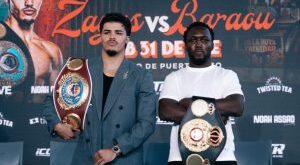When boxing historians name the greatest to ever lace up a pair of gloves, one name that echoes through time is Henry Armstrong — better known in fight circles as “Homicide Hank.” Born Henry Jackson on December 12, 1912, in Columbus, Mississippi, Armstrong is widely regarded as one of the top ten fighters of all time — and in many circles, he’s ranked even higher.
In fact, The Ring magazine, in a 2007 poll spanning 80 years of boxing history and compiled by legendary historian Bert Sugar, named Armstrong the second greatest fighter of all time, just behind the incomparable Sugar Ray Robinson.
What earned Armstrong such lofty status? For starters, he’s the only man in boxing history to simultaneously hold world titles in three weight classes — featherweight, lightweight, and welterweight — back when there were only eight traditional divisions, from flyweight to heavyweight. Today, with 17 weight classes, such a feat seems nearly impossible.
An Unbreakable Record
Armstrong’s reign at welterweight is the stuff of legend. Between May 31, 1938, and October 4, 1940, he defended his title 20 times — winning 14 of those by knockout. He captured the belt from the great Barney Ross by unanimous decision and held it for just over two years and five months before losing it to Fritzie Zivic at Madison Square Garden. No one before or since has managed so many defenses in such a short span.
At featherweight, Armstrong captured the title on October 29, 1937, stopping Petey Sarron in six rounds. He would never defend that belt. He added the lightweight crown on August 17, 1938, defeating Lou Ambers by split decision, only to drop it in a rematch a year later at the old Yankee Stadium in a controversial decision.
A Hurricane in the Ring
Nicknamed both “Homicide Hank” and “Hurricane Henry,” Armstrong was known for his relentless pressure, ceaseless punch output, and granite-like stamina. He fought 171 professional bouts, taking on some of the best fighters of his era: Barney Ross, Lou Ambers, Fritzie Zivic, Ceferino Garcia, and a young Sugar Ray Robinson, who beat Armstrong on points in a fight that reportedly left Robinson emotional — Armstrong was his idol.
In his bid to capture a fourth world title, Armstrong fought to a draw against Garcia in a middleweight title bout — a decision many felt should’ve gone his way. That attempt, though ultimately unsuccessful, underscored his ambition and greatness.
Humble Beginnings to Hall of Fame Legacy
Armstrong’s pro debut was far from auspicious. On July 27, 1931, fighting under the name Melody Jackson, he was knocked out in the third round by an unknown named Al Iovino — the lone claim to fame for the otherwise forgettable opponent.
But what followed was a career of staggering achievement: 151 wins (101 by KO), 21 losses, and 10 draws. His early years saw him fighting often in Mexico, taking on local standouts like Baby Arizmendi and Juan Zurita — fights that helped sharpen his iron will and relentless style.
Later in life, Armstrong battled alcoholism and found redemption in faith. He became a Baptist minister and worked with troubled youth, dedicating himself to guiding others after stepping away from the sport. He briefly attempted a comeback before officially retiring in February 1945 after a loss to Chester Slider. He also worked as a referee for a time.
In his later years, Armstrong suffered from vision problems and dementia. Despite earning a fortune with his fists, much of it was lost. Still, his place in boxing history remains untouchable. He passed away on October 22, 1988, in Los Angeles, just two months shy of his 76th birthday.
Henry Armstrong wasn’t just a great boxer — he was a force of nature. A relentless storm in the ring. A fighter whose legacy will never be forgotten.
Source link
 Boxing News Boxing News
Boxing News Boxing News





